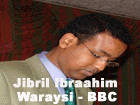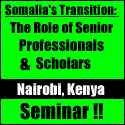|
Since The main task of The Center is to provide a neutral forum for dialogue and to create the opportunity to discuss and address development & reconstruction issues of common concern to the Somali Society, WSP International proposes launching a 'Dialogue for Peace' - an extensive process of public consultation on issues pertaining to peace building and state reconstruction.
|
|
Aim and objectives: With the above considerations in mind, WSP International proposes a process of extensive public consultation on issues pertaining to reconciliation. The main purpose is to contribute directly to local and sub-national conflict resolution efforts, while indirectly supporting the national peace process.
Secondary aims include the following:
 |
To empower the general public to speak out coherently on national issues of reconciliation and state formation; |
 |
To obtain as broad a cross-section of public opinion as possible on politically and socially divisive issues; |
 |
To identify areas of broad consensus and significant differences; |
 |
To assist groups to better understand one another's positions and to narrow the differences between them through dialogue; |
 |
To provide Somali leaders and international actors with greater insight into public opinion, expectations and concerns |
 |
To remind citizens of their rights and responsibilities when a national authority is eventually established; |
 |
To raise public awareness about national issues pertaining to the formation of a new government. |
Methodology: The consultative process would apply a variation of the participatory action research (PAR) methodology applied by WSP in Somalia since 1996: an inclusive, consensus-oriented dialogue led by local actors and facilitated by national researchers.
 |
Organization: The project would involve currently existing WSP - affiliated teams in Mogadishu and Garowe, as well as newly-established "antennae" based in Kismayo, Baydhowa and Beledweyne. A core WSP International management team would co-ordinate these efforts and provide administrative and logistical support. |
The process would be guided from the outset by a "National Project Group" (NPG) of eminent persons drawn from a broad cross-section of Somali society.
The Consultative Process: The consultative process would begin with a relatively rapid (6 weeks) conflict mapping exercise upon which priorities for more comprehensive dialogue would be based. WSP field teams would travel extensively through their respective areas of responsibility, explaining the purpose of the process and soliciting feedback, capturing discussions in both written and audiovisual form. In so doing they would also familiarize themselves with the current situation, stimulate local interest and identify potential local partners for the continuing consultative process.
Outcomes:
 |
A Somali public more aware of and engaged with issues concerning national reconciliation and state formation; |
 |
Somali leaders and international actors with more exposure to Somali public opinion on key issues relating to reconciliation and peace-building, and therefore greater understanding, and enhanced accountability; |
 |
An overall 'Note' and film, plus a report and a film on each issue identified as an Entry Point; |
 |
A 'national conversation' initiated and experienced by Somali's inside and outside of the country that can continue under its own momentum beyond the Dialogue project; |
 |
Conferences and dissemination of results to national and international partners engaged in the peace process. |
|









